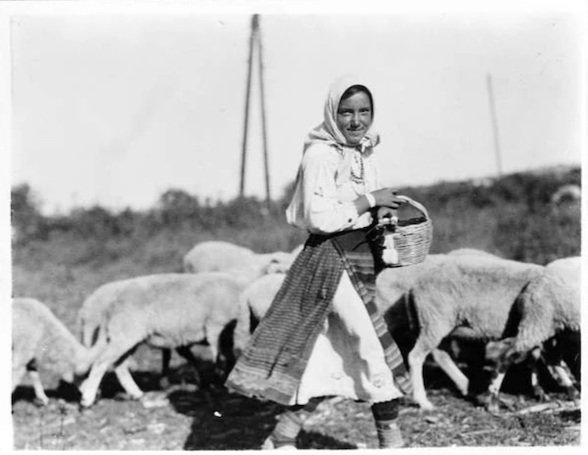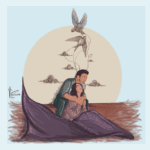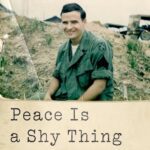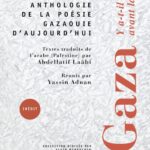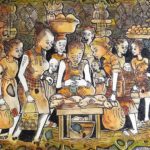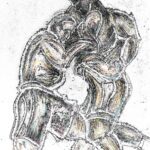for Omari from Afghanistan
You shouldn’t have done it, Janna.
Happiness is a simple thing, you said. Happiness is a cool shadow and you looking at me. But we don’t have cool shadows in Trun. In summer there is no grass. The dust is knee-deep, and it is so hot your heels bleed, and there are flies in the thick air that drink water from your eyes. The sun is so red you can’t look at it. There are no trees. I will not be in Trun to look any more, Janna. Yesterday, Farzin came to my father. They talked for a while. You know what happens when Farzin comes to a guy’s shack. My mother cried when Farzin went out and dad didn’t look me in the eyes.
“Babur,” he said. “They’ll come to take you tomorrow. You can go to say goodbye to your brothers.” Then dad smoked and his eyes were in the dust as he said, “Farzin said he’d bring you back to us. They won’t cut your face, he said.”
Mom was silent. She wiped her eyes with the back of her hand, then she went behind the shack. You never saw her blubber or cry. She came back carrying our old goat, she killed it and there was blood on her hands. It would’ve been better if dad scolded her. What would the other kids eat now, that was what he should have said. Dad said nothing. My brothers were all looking at me, saying nothing. My sisters were there saying nothing.
“I’ll cook a stew for you, son,” Mom said pressing the dead goat to her puny chest.
A week ago, after the sand storm, one of the shepherds found a dead man. That man’s throat was slashed. He was from the Hamasa clan and his body was strong. I knew this man—he used to collect dry thorns for his goats in the mountain.
Happiness is a simple thing, you said: daylight and you looking at me. If one of the Hamasa men got killed, one of our Feda men had to be killed. Blood for blood, it was as simple as that.
“Housyar, you’d better decide which of yours will be the one,” Farzin had said to dad. “I’ll come to collect him after midday bread. He has to be the same age as the dead Hamasa guy. They don’t want an old man and they don’t want a sick man. You know what will happen if you don’t give one of yours.”
Mom knew what would happen. The Hamasas would come and kill my seven brothers one by one. They wouldn’t kill my sisters. There were worse things one could do to a woman, things worse than death. There were too many mouths that wanted to eat in that mountain. And there was dust, knee-deep, hot brown powder, in which thorns grew. But thorns were not enough. There were goats that ate them and water was too scarce to grow more. No court and no law came to Trun. No one had ever seen a judge. Farzin would come to take a new guy after midday bread. Two days later, Farzin would drive the body back to his family. The guy’s brothers and sisters would wash him, and in the evening when it was not so hot, they drank tea. The Hamasas like us, made tea from the thorns. It was bitter. It made you dizzy, you saw things that were not there, but you slept. You slept like a stone, and you didn’t see the body of your dead brother.
“Babur,” Dad said to me, “You are the weakest. This way, or the other, you won’t live long. But don’t you show the Hamasas you are sick, my son. Go pick the thorns. Let the Hamasas see you picking them.”
You know there’s something wrong in my chest, Janna. You’ve seen me cough and wheeze. If I go out when it rains, I choke on the wind. I fall and I pray the rain turns into a drizzle. I can’t walk.
Dad was right. This way, or the other, I wouldn’t last long. But, Janna, you know happiness is a simple thing. Some wind, some thorns for our tea, and you. If I weren’t sick, they wouldn’t let me come to your shack, would they?
“Babur is a sick wreck,” your mother said. “And he’s got a good mouth. He thinks up good tales. There’s no harm listening to him.”
Then, I learned happiness was a simple thing. “Got another of your sweet lies, Babur?” your mother would say. I didn’t, but the dust was full of summer tales, and there were thorns boiling for tea. And in winter, there was snow taller than the shacks, and there were thorns again, burning in the hearth. Maybe I was to blame for everything. I taught you to believe in the nonsense I spoke to you and your sisters.
You shouldn’t have done that, Janna.
Midday passed, and the stew Mom made with the goat she’d killed waited on the table. I asked myself what the other kids would eat later. There was no milk for the new baby and no meat for the sick. My brothers looked at me. They didn’t eat. Dad and Mom didn’t eat either. My sisters looked at me, the youngest one sobbing softly, the others quiet. I thought about the fairytales. Snow was bread, Mom had told me, and dust was flour. The best flour you could find in Trun Mountain.
“No crying,” Dad said. “Eat.”
We waited.
“Run away,” Mom had said to me the night before. “We can bring you something to eat.”
“He’s sick,” Dad’s voice crawled like the dust. “They’ll kill him and they’ll kill us. Better eat the stew she cooked for you, son.”
We waited and waited and Farzin didn’t come.
“What does he want?” Dad grumbled. “Perhaps he expects us to bring you to him?”
No way, that had never happened before. No man in his right mind would do such a cowardly thing. I tried not to think about it, Janna. I remembered when it rained. Not during the rain, when the valley was a cauldron of steaming red mud and black clouds, but about the flowers that sprouted after the rain. Red and blue and yellow, they grew on the roofs of the shacks, and they shot up under our feet, so many that we couldn’t see the sand.
“Babur,” you said. “These flowers are just like the tales you told us. Look at them. Happiness is a simple thing.”
If I hadn’t been sick your father wouldn’t have let me talk to you. Your mother wouldn’t bring tea for me. And I told you a lie once, Janna.
“Take a handful of the wet mud after the rain is over and knead it well. Put some petals of the flowers in that mud and let it dry. Then give that ball of dry clay to the person you want to be happy. And he will be.” It was a lie, Janna. I found a ball of dry clay in front of our shack. My sisters told me you made it for me.
“I’ll go instead of you, Babur,” Dad said.
We all knew it was impossible. The dead Hamasa guy was strong and young. Dad was old. I was the weakest man in the whole village and the cold in the winter would take me soon, or the heat in summer would.
But nobody can tell such beautiful tales, Babur, you said. You know what the dust speaks and you know what the wolves think. And you know where the flowers go after the rain is over.
“Chew this when they start beating you,” Dad said. “Chew and it won’t hurt.”
“Babur, run away, son! I won’t give you to them!”
“But the village has made a decision, woman,” Dad said.
“We’ll run away from the village.”
“Then our own clan will catch us. Your own brothers will stone you to death, woman.”
“I don’t care. I won’t give them Babur.”
“If they don’t kill me, Mom, I won’t make it through the winter.”
“You’ll make it, son, you’ll make it. You can take my word for it. Run, Babur!”
Then Dad went up to her, he walked very slowly to her, as he always did. He went slowly up to her and hit her.
“Say one more word and I kill you,” he told her.
“Kill me,” she said. “Kill me. I won’t give them Babur.”
Dad’s hand went limp. No one ate from the goat stew and the shack was full of the most beautiful aroma the mountain had ever created. My sisters were quiet. The midday eating had to be over. I knew it by the shadows of the peaks, which crept on the ground and mixed with the dust. Farzin came in. No one had heard him drag his feet on the gravel. He dragged his feet and kicked the dust when he came to collect our guy for the Hamasas. He had killed more people than there were stones in the village now.
“Babur can stay with you,” he said slowly. “Now give me a bowl of your stew for the good news I brought you.”
Ma gave out a sob. My brothers stood up.
“Don’t make fun of me,” Dad wheezed. “You are an important man, but it’s my house.”
“Keep your sickly son of yours at home,” Farzin said. “Somebody else went to the Hamasas instead of him.”
The silence was thicker than the heat. Dad’s face was gray, Mom’s cracked lips bled.
“Give me that stew,” Farzin said.
“Who went instead of him?” Dad croaked.
“You wouldn’t want to know.”
“Tell me who went instead of him, and I’ll give you some stew.”
Farzin’s face sweated, his lips were wet with saliva. He swallowed a couple of times.
“Janna went instead of him,” Farzin said. “Ran away from her family. Her father, old Giti, cropped her hair. Shame on them! That girl must have been mad. The whole family is disgraced.”
I could not hear Farzin talk. I saw you picking the flowers after that big rain, and I saw you make a big heart of clay with the flower petals in it.
You’ll be healthy, Babur, you said.
Janna, why did you do that! I can no longer see the dust, and I cannot see the mountain. I see what they are doing to you. I wish you were dead. I wish I were dead.
“Janna is young and strong,” Farzin said.
“She won’t die quickly,” Dad said.
“She’s young and she’ll last long,” Farzin said. “Each one of the Hamasa lads will have a piece of her as long as she lasts.”
I hit Farzin as hard as I could. I hit him, and I hit him, and I hit him as long as I could see him. Then there was dust in my mouth and blood in my eyes.
Janna, I see you in the evening when the sky sleeps. I see you in the daylight. Happiness is a simple thing.
In the heat it suddenly rained. Clouds and skies and dust mingled, and the valley was a lake of red mud and stones. Goats were drowned in the whirlpools. And then the sun shone. There were flowers—red and blue and yellow and lilac, all the mountain was flowers.
I’ll come and find you, Janna. I’ll come to the Hamasas and I’ll find you. And I will tell you the most beautiful tale. Happiness is a simple thing. Happiness is you.
Zdravka Evtimova (Author and Translator)
Zdravka’s short stories have been published in over twenty countries. Her novel Thursday won The Best Bulgarian Novel award in 2003 from the Union of Bulgarian Writers. As well, she has been awarded: a residency by the Shanghai Writing Program in 2012, the Balkanika Award for best book of the year by an author from the Balkan countries in 2013, and her short story “Seldom” was included in the Best European Fiction 2015.
She’s translated more than twenty novels by American, English, and Australian authors into Bulgarian, including the Nebula Prize-winning novel Red Mars by K.S. Robinson, Project Pope by Clifford Simac, What I Loved by Siri Hustvedt, among others. She has also translated into Bulgarian works by Salman Rushdie, Arthur Miller, Sam Shepard, V.S. Naipaul, John Updike, Jonathan Franzen, Raymond Carver, T. Coraghessan Boyle, and more. She lives in Pernik, Bulgaria where she works as a literary translator.
